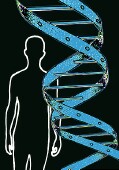
TUESDAY, Oct. 16 (HealthDay News) — Scientists have developed a new DNA test for colorectal cancer and for cancer precursors that seems to be not only accurate, but also noninvasive.
If approved by the U.S. Food and Drug Administration, experts say, the test could be a welcome alternative to colonoscopies, which require a lengthy and uncomfortable preparation.
“The study is interesting and may hold some promise in the future,” said Dr. David Beck, chairman of the department of colon and rectal surgery at Ochsner Medical Center in New Orleans. “More testing needs to be done to confirm the findings, and we need to know how available the test will be and what it will cost.”
“Currently, it is estimated that almost 50 percent of Americans have not been screened [by any method] for colorectal cancer,” added Beck, who was not involved with the study. “Most tests are better than nothing. If further study confirms the usefulness of this test, it would be a significant help.”
The researchers began with stool samples from more than 1,000 people who were undergoing colonoscopies for screening and who had just had a colonoscopy that identified a malignancy or pre-malignancy.
In previous studies, the researchers had identified 11 biomarkers that, when combined, could indicate the presence of cancerous or precancerous lesions.
The test has three components, said study author Graham Lidgard, senior vice president of research and development and chief science officer at Exact Sciences in Madison, Wis., which developed the test and funded the research.
The first identifies methylation in two genes. Methylation is a process that can turn off tumor suppressor genes that would normally help curb the proliferation of cancer cells. Abnormal methylation can be found in both colorectal cancers and pre-cancers.
The second component searches for DNA mutations in the K-ras gene. Mutations in this gene can spur tumor growth, and these mutations can be identified both in cancers and in pre-cancers.
The third component detects blood in the stool, which may be a sign of colon cancer.
“These three together give us pretty high sensitivity for cancer and a good sensitivity for [precancerous tumors],” Lidgard said.
In this study, the test identified 98 percent of all cancers and 57 percent to 83 percent of cancer precursors.
Current tests aren’t able to detect precancerous tumors, Lidgard said.
The findings were to be presented Tuesday at the annual cancer prevention conference of the American Association for Cancer Research in Anaheim, Calif. Research presented at medical meetings are considered preliminary until published in a peer-reviewed journal.
The researchers now are involved in a larger study, which is analyzing stool samples from more than 10,000 patients. The company expects to submit an application for approval to the FDA within the first quarter of next year, Lidgard said.
“From our point of view, anything that can increase the number of people who get screened will help reduce the incidence of colorectal cancer,” he said.
More information
The U.S. National Cancer Institute has more on colorectal cancer.

